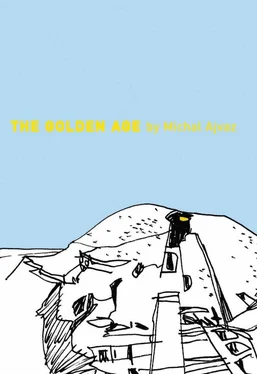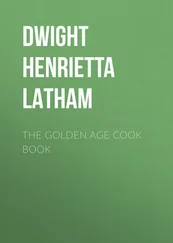Michal Ajvaz - The Golden Age
Здесь есть возможность читать онлайн «Michal Ajvaz - The Golden Age» весь текст электронной книги совершенно бесплатно (целиком полную версию без сокращений). В некоторых случаях можно слушать аудио, скачать через торрент в формате fb2 и присутствует краткое содержание. Год выпуска: 2010, Издательство: Dalkey Archive Press, Жанр: Современная проза, на английском языке. Описание произведения, (предисловие) а так же отзывы посетителей доступны на портале библиотеки ЛибКат.
- Название:The Golden Age
- Автор:
- Издательство:Dalkey Archive Press
- Жанр:
- Год:2010
- ISBN:нет данных
- Рейтинг книги:4 / 5. Голосов: 1
-
Избранное:Добавить в избранное
- Отзывы:
-
Ваша оценка:
- 80
- 1
- 2
- 3
- 4
- 5
The Golden Age: краткое содержание, описание и аннотация
Предлагаем к чтению аннотацию, описание, краткое содержание или предисловие (зависит от того, что написал сам автор книги «The Golden Age»). Если вы не нашли необходимую информацию о книге — напишите в комментариях, мы постараемся отыскать её.
is Michal Ajvaz’s greatest and most ambitious work.
The Golden Age
The Golden Age — читать онлайн бесплатно полную книгу (весь текст) целиком
Ниже представлен текст книги, разбитый по страницам. Система сохранения места последней прочитанной страницы, позволяет с удобством читать онлайн бесплатно книгу «The Golden Age», без необходимости каждый раз заново искать на чём Вы остановились. Поставьте закладку, и сможете в любой момент перейти на страницу, на которой закончили чтение.
Интервал:
Закладка:
“I don’t remember anything of the sort. You’re just making things up again,” the woman said grumpily. But it seemed that the man hadn’t heard her, that he was completely distracted by his master the prince. The puppet walked stiffly around the table, raising and then dropping its arms before calling: ‘The prince! The prince! How marvellous the times before the Reconquista, when he set out for the City of Pure Light, when we — filled with infinite gratitude and immeasurable hope that the golden age would return — bade him farewell at the kiosk whose light blazed in the dark, there at the tram terminus, the last time we drank coffee together from the plastic cup which is a timeless symbol of our brotherhood!’”
“If the prince really does exist and isn’t just some paper demon or a figment of your imagination, then he’s certainly the same kind of worthless thing as you are, the same kind of loud-mouthed coffee-house loser. You’re always using him as an excuse, you’re always rambling on about a City of Pure Light and messages from the prince, but for all I can see you spend your days just hanging around with your friends in coffee-houses sipping sweet liqueurs; all of you would be better off with a proper glass of apricot schnapps. And when you get home you don’t lend a hand with anything, you just go straight to your room and shut yourself in, saying you’ve got work to do, that you’ve got to cut animals out of plywood with a fret-saw. But I know full well what you do in there: you amuse yourself with your lovers. I’m not as big a fool as you think; I see right through you. You’ve given them dresses in the same pattern as the wallpaper in your room, and you’ve stuck wallpaper masks on their faces as if you think that’ll keep me from recognizing what they are. But I’ve known about your lovers for years; I’ve heard them laughing and I’ve seen the flash of the diamond teeth you bought them. I see them very well, and I talk to them, too. As soon as you leave for the coffee-house I go in to them and we talk about you; they ridicule and impersonate you; we all laugh at you, and their diamond teeth glow in the lamp-light and glint across the room.”
“You don’t understand anything: the wallpaper, suits and masks are of the splendid fabric used for the curtains of the chateau in the City of Pure Light in the era of its glory, before the treacherous tanks of Byzantium drove into its streets. As the city was being evacuated I managed to salvage a little of this fabric to remind me of the happy days which it was my good fortune to spend in the galaxy’s secret capital. I used it to make wallpaper and clothing for the women among my old friends and comrades-in-arms who escaped from the Byzantine despots along with me.”
The man paused and the woman said nothing. Then two curtains darted across the stage, one from each side, while two strings came down from above from which was suspended a sign bearing the words “Entr’acte: 10 minutes.” There was the sound of shuffling legs and coughing.
“Boring, isn’t it?” said an unusually deep female voice; it belonged to the woman sitting next to me, who had turned to face me. “Today’s show is pretty rotten,” she sighed. “In fact, every show is worse than the one the day before. I’m thinking of giving up on the boat theatre.” Then she asked me out of the blue whether I knew anything about old clocks. I answered in surprise that the repairing of old clocks had long been a hobby of mine, that I indulged in this esoteric delight almost every free evening I had.
“Your beautiful fingers told me that might be the case,” said the woman. “I’ve been watching them and imagining them moving about in a labyrinth of cogwheels. They look incredibly dexterous and quick.” The woman stroked my fingers shyly, giving the impression she would never tire of their touch; then she leaned towards me and whispered, “I am in great anguish and I think you might be able to help me. It’s my antique clock: a month ago it just stopped. I appreciate that your time is precious to you, but I was wondering if you’d do me the kindness of coming home with me to take a look at it. When all’s said and done, today’s play is a real disappointment with so few elevated thoughts in it, and so little nobility. Since my clock stopped ticking, my apartment has been so quiet, particularly at night, when I doze to the groaning of the building and a rustling which takes my memories captive and turns them into recollections of some ancient evil. Every night the building resounds with age-old insults and vicious mockery. The boat’s almost reached its next stop; I live close to the jetty, we’ll be there before you have a chance to stretch your legs. I’d be delighted if you’d take a look at the clock. Who knows, maybe you’ll be able to tell me what’s wrong with it. For you it’ll probably be child’s play. And it’ll be enough for me to hear your opinion on it. While we’re at it, I’ve got some rather special wine for us to drink. Friends of mine brought it back from the vineyards of Bordeaux.”
I was a little intimidated by the woman’s deep voice, and I shuddered at the thought of the rooms in which it had probably been formed, the reverberations of which could be heard within it (gleaming antique furniture, modernist lamps, Japanese electronics with fidgety little green lights). I was inclined to make my excuses but was too lazy to come up with a reason; I was also tempted by the prospect of the insides of a valuable old clock and a glass of good French wine. So I told the woman I would go with her, just for a short while. Almost as soon as I accepted the offer, the boat shook as it touched the jetty. Several other members of the audience left their seats along with us. Up on deck I saw that the fog had cleared somewhat, that the boat was at anchor between the Steel Bridge and the Palacký Bridge. There were a number of new audience members waiting to board.
Crime and punishment
No doubt it was high time I was bringing my story to a close, but on that day the shell was rather tough; it looked taut enough to burst but the red juice was still spurting out of it. There was nothing to do except for me to continue with my invented story, to reimmerse myself in the waves of long sentences, not knowing where they would carry me. The woman was leading me through the wide, quiet streets of the Podskalí her garrulousness, which had irritated me so much on the boat, had ceased, and we walked on in a silence I found embarrassing. For something to say I explained how I had disliked the boat and how glad I was no longer to have to listen to the nonsensical dialogue carried on by the puppets, of which I had understood nothing. When the woman gave no answer to this I became even more uncomfortable. As I was searching for an excuse by which I could wriggle out of this, my guide stopped in front of a building and proceeded to unlock its front door. We climbed a dimly-lit staircase. As soon as we entered the apartment — which was exactly as I had imagined it — the woman led me over to an empire commode, upon which, propped against the wall, there stood a beautiful pillar and scroll clock adorned with cherub figurines. I opened it carefully and pushed my right hand in among its dozens of cogwheels.
“I think the fault is somewhere further back,” said the woman, who was standing right behind me. “Maybe a little spring has snapped right at the back, right up against the rear wall. You need to get in as deep as you can — I know the clock is unusually deep, but I’m sure you can manage it with those fine, slim hands of yours.” Now I heard a hint of mockery in the woman’s flattery. And I was a little put out that so far there had been no mention of French wine. Would it not be for the best if I were to disengage myself from the broken clock and make a hasty retreat from this posh, inhospitable apartment? But then again, I was truly curious about the insides of the instrument; it was as if it were making room for me to enter, and I went up to the elbow, up to the shoulder, and still I didn’t touch bottom. Was I the victim of a conjuring trick? At last fear got the better of my curiosity and passion for clocks, and I began to withdraw my arm, taking great care not to damage the delicate wheels or to injure myself on their teeth. But when my arm was still in the clock up to the elbow, there was a whirring sound and the wheels began to turn, vibrate and otherwise move about rapidly; before I had time to remove my arm the sharp teeth tore into my shirt and bit into the skin, gripping my wrist and failing to release it. I could feel how my blood was dripping onto the mechanism from many small wounds. I called out to the woman for help, but she remained standing behind me, saying nothing.
Читать дальшеИнтервал:
Закладка:
Похожие книги на «The Golden Age»
Представляем Вашему вниманию похожие книги на «The Golden Age» списком для выбора. Мы отобрали схожую по названию и смыслу литературу в надежде предоставить читателям больше вариантов отыскать новые, интересные, ещё непрочитанные произведения.
Обсуждение, отзывы о книге «The Golden Age» и просто собственные мнения читателей. Оставьте ваши комментарии, напишите, что Вы думаете о произведении, его смысле или главных героях. Укажите что конкретно понравилось, а что нет, и почему Вы так считаете.












